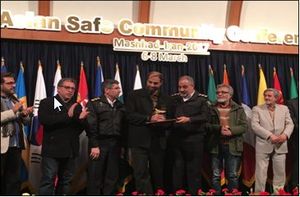March 9-11, 2017 (Mashhad, Iran)
Convening over 100 officials from the local governments of Mashhad and Shiraz in Iran, a representative from ADRC/IRP served as co-facilitator along with UNISDR's Global Education and Training Institute (GETI) in the Workshop on Local Implementation of the Sendai Framework, 9-11 March 2017 In Mashhad, Iran. The workshop was organized by the Mashhad Disaster Management Department to help ensure that the municipality is resilient to disasters.

Mashhad is not only the second important city of Iran (after Tehran) in terms of population, economy, and industry, but it is also the second most exposed city to disaster risks. The municipality is mainly exposed to earthquakes and floods, recognizing the need to put in place necessary measures to reduce disaster risk. The municipality is actively working on key policies and legislation to promote disaster risk reduction and management towards achieving sustainable development of the town. It promotes efforts of integrating DRR in its urban development processes, and mitigating risks in reasonable level with the view of preparing to build back better in recovery, rehabilitation, and reconstruction. In addition, the municipality is an active participant of the UNISDR Making Cities Resilient (MCR) campaign. This campaign supports the capacity building activities of local experts and officials with a focus on developing and implementing a City Resilience Action Plans based on the MCR Campaign 10 Essentials to make their cities resilient to disasters. ADRC/IRP representative shared global experiences and best practices along the 10 Essentials for making cities resilient.
As way forward, the municipality of Mashhad, being one of the pioneering local governments in the region to receive the workshop, committed to pursue two key activities. Firstly, a team will be created to continue to facilitate the discussions and planning so that within the next six to eight months, a complete draft of the Resilient City Action Plan will be ready for adoption and implementation. Secondly, the Mashhad Disaster Management Department will facilitate coordination to realize the plan of making Mashhad, the Center for Education and Training on urban risk reduction in Iran.
(2017/03/17 14:40)


